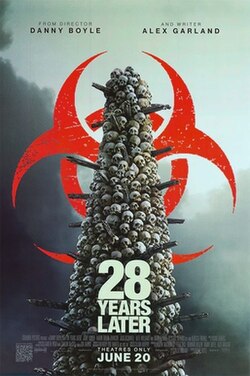Nevertheless, I've updated yesterday's post which approvingly quoted Kevin D. Williamson, who said "We have an indecisive president—and it is decision time". This apparently turned out to be, um, a misguided missile.
So I guess it's time to look at the resulting commentary. The National Review editors are OK with bomb, bomb Iran: Trump Enforces His Red Line on Iran.
President Trump has been quite clear for as long as he’s been in politics that under his watch, Iran would never be allowed to get a nuclear weapon. In the early months of his second term, he said that he hoped to be able to find a diplomatic solution to the Iranian nuclear threat but, if not, he was prepared to take military action. On Saturday night, he followed through.
After a week of Israeli attacks that took out Iran’s air defense systems, crippled its military command, and dealt damage to its nuclear program, Trump delivered what was intended to be the death blow. He ordered American bombers to strike Iranian nuclear facilities at Natanz, Isfahan, and the heavily fortified Fordow. While there was great debate over whether Israel was capable of finishing off Fordow without access to B-2 bombers or 30,000-pound “bunker busters,” U.S. action was clearly the most straightforward path to taking out the facilities.
There's a bit of Constitutional throat-clearing later: "As we noted previously, such action should have been approved by Congress."
How about the WSJ editorial board? They say: Trump Meets the Moment on Iran.
President Trump’s decision to strike Iran’s three most significant nuclear sites on Saturday helped rid the world of a grave nuclear threat and was a large step toward restoring U.S. deterrence. It also creates an opportunity for a more peaceful Middle East, if the nations of the region will seize it.
“Iran’s key nuclear enrichment facilities have been completely and totally obliterated,” Mr. Trump said Saturday night. He made clear Iran brought this on itself. “For 40 years, Iran has been saying ‘death to America,’ ‘death to Israel.’ They’ve been killing our people,” he said, citing 1,000 Americans killed by Iran-supplied roadside bombs and other means. A nuclear Iran was a perilous threat to Israel, the nearby Arab states, and America.
Mr. Trump gave Iran every chance to resolve this peacefully. The regime flouted his 60-day deadline to make a deal. Then Israel attacked, destroying much of the nuclear program and achieving air supremacy, and still the President gave Iran another chance to come to terms. The regime wouldn’t even abandon domestic uranium enrichment. Ayatollah Ali Khamenei wanted a bomb more than peace.
I don't think the WSJ mentions that Congressional thing. For that, let's turn to Matthew Petti, Reason's resident peacenik: Trump Shreds the Constitution By Bombing Iran.
The world found out about another American war through social media. "We have completed our very successful attack on the three Nuclear sites in Iran, including Fordow, Natanz, and Esfahan," President Donald Trump wrote on Truth Social at 7:50 PM on Saturday night. "NOW IS THE TIME FOR PEACE!" he added.
Trump told Fox News' Sean Hannity that he had B-2 stealth bombers drop bunker-buster bombs on the underground Fordo nuclear facility, and submarines launch Tomahawk missiles at additional nuclear facilities in Natanz and Esfahan. He gave Iranian leaders a heads-up before the attack, reassuring them that the U.S. was aiming for a one-off strike rather than a regime change war, according to CNN and CBS. Iranian media downplayed the results, claiming that at Fordo only two entrances were damaged.
This campaign is a war of choice. And the administration did not try to sell it to Congress—let alone the American people—before embarking on it. Instead, Trump watched Israel launch a first strike on Iran, then threatened to get involved, talking himself into a corner. Now he seems to be hoping that Iran simply won't respond to being attacked.
In case I haven't mentioned it recently: I am totally unqualified to comment on foreign policy, including war policy. I'm old enough to remember a long line of policy "experts" making confident predictions and plausible recommendations that turned out to be total wrong-headed garbage. So what chance do I have to do better?
All I can do is hope this makes things better in the long run.
Also of note:
-
I'm always a sucker for a Casablanca reference. And Jonathan Turley brings it: The Claude Rains School of Constitutional Law: Democrats Denounce Iranian Attack as Unconstitutional.
Yesterday, I wrote a column in the Hill discussing how Trump is unlikely to go to Congress in launching an attack on Iran and how he has history on his side in acting unilaterally. The column noted that many Democratic politicians and pundits who were supportive of such unilateral actions by Democratic presidents such as Bill Clinton and Barack Obama are suddenly opposed to Trump using the same power. It is the Claude Rains School of Constitutional Law where politicians are “shocked, shocked” that Trump is using the authority that they accepted in Democratic predecessors.
Jonathan notes how silent today's Democrats were after (for example) Obama's bombing of Libya. And some who were not silent gloated jubilantly.
But that was then, and this is…
-
I missed Porcfest again. It was all the way up in Lancaster, from where Pun Son, my dog, and I witnessed the solar eclipse last year. And it cost money to get in!
Probably David D. Friedman got in free, though. He was inspired by one of the speakers, "Angela McArdle, sometime chair of the Libertarian Party and currently of the Mises Caucus" to muse on Strategies for Libertarians.
Andrea recounted the LP's flirtation with Trumpism, which caused the freeing of Ross Albricht and appointment of "libertarian" RFK Jr to be HHS Secretary. Win? David notes two problems with such a strategy:
The first is to the reputation of the libertarian movement. The Libertarian Party has long labeled itself “The Party of Principle;” part of the attraction of the libertarian movement is the appearance of consistent support of liberty across a wide variety of issues, from drug laws to professional licensing to immigration, of being motivated by a consistent philosophy of freedom. If the party is seen as visibly supporting Trump, as it will be by anyone who listened to McArdle’s webbed talk, it will be seen as sharing the responsibility for all of his actions, some of them far from libertarian. That will make it harder to recruit or retain as members, of the movement as well as the party, anyone opposed to Trump’s policies. Since Trump is not a libertarian that is likely to include not only anyone left of center but also anyone seriously committed to libertarianism.
The second cost is the effect of alliance with Trump, or with any other non-libertarian movement, on libertarian doctrine. Libertarians who are Trump allies will feel pressure to minimize the conflict between his beliefs and theirs, to create libertarian defenses for unlibertarian policies in order not to feel obliged to attack their allies. That effect will be reinforced by the change in the personnel of the movement as Trump supporters join, libertarians hostile to Trump’s policies leave. In enough time the result is likely to be a “libertarian” party, possibly a “libertarian” movement, that is no longer libertarian.
I'm glad I'm not a political joiner.
| Recently on the book blog: |
| Recently on the movie blog: |
![[Amazon Link]](/ps/asin_imgs/B07R5BNH3Z.jpg)


![[The Blogger]](/ps/images/barred.jpg)



